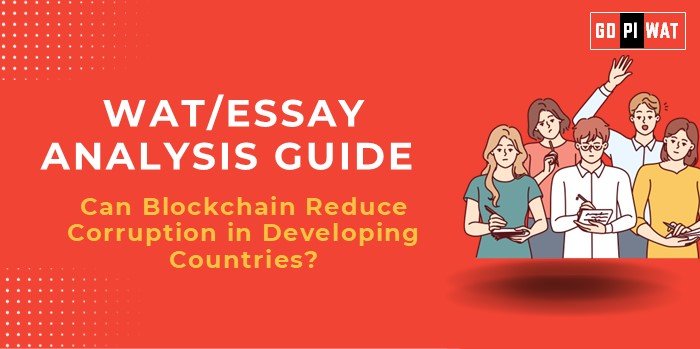📋 Written Ability Test (WAT)/Essay Analysis Guide: Can Blockchain Reduce Corruption in Developing Countries?
🌐 Understanding the Topic’s Importance
Blockchain holds transformative potential to curb corruption, a pervasive issue in developing countries, by ensuring transparency in financial systems, public procurement, and record-keeping. For B-school students, understanding blockchain aligns with the study of ethics, governance, and digital transformation.
🕒 Effective Planning and Writing
- 📖 Time Allocation (30 minutes):
- 📝 Reading & Planning: 5 minutes
- ✍️ Writing: 20 minutes
- 🔍 Review: 5 minutes
- 📚 Suggested Structure:
- 📜 Introduction: 60-70 words
- 📝 Body: 350-375 words
- 📄 Conclusion: 60-70 words
💡 Introduction Techniques
- Contrast Approach: “While corruption drains $1 trillion from developing nations annually, blockchain’s transparent ledger offers a beacon of hope.”
- Solution-Based Approach: “Blockchain, with its immutable records, could redefine governance by eliminating fraud in critical sectors like land and public spending.”
🏗️ Structuring the Essay Body
- Achievements:
- 📌 Highlight global examples like Estonia’s e-governance success.
- Challenges:
- 🌐 Barriers such as digital illiteracy and high costs.
- Future Outlook:
- 🔗 Propose integrating blockchain with AI and fostering public-private partnerships.
✍️ Concluding Effectively
- Balanced Conclusion: “Blockchain can serve as a vital tool to curb corruption, but its effectiveness hinges on infrastructure development and stakeholder commitment.”
- Future-Focused Conclusion: “For blockchain to succeed, developing countries must prioritize digital literacy, infrastructure, and governance reforms.”
📊 Analyzing Successes and Shortcomings
- 🏆 Key Achievements: Transparency in financial systems, efficiency in public procurement.
- ⚠️ Ongoing Challenges: Resistance to change, lack of legal frameworks.
- 🌍 Global Context: Estonia, with over 99% of its public services online, serves as a model for blockchain-driven governance.
🌱 Recommendations for Sustainable Progress
- 🔧 Develop digital infrastructure and skills.
- 📜 Introduce blockchain in phases, starting with high-impact areas like public spending.
- 🤝 Collaborate internationally to adapt blockchain best practices.
✍️ Sample Short Essays
- Balanced Perspective: “Blockchain’s potential to reduce corruption is unparalleled due to its immutable nature. However, without infrastructure and legal frameworks, its adoption in developing countries remains a challenge.”
- Solution-Oriented: “Adopting blockchain can transform governance in developing nations by ensuring transparency. Key to its success is investing in digital literacy and robust cybersecurity.”
- Global Comparison: “While countries like Estonia lead in blockchain adoption, developing nations must overcome infrastructural and societal barriers to replicate similar success.”


